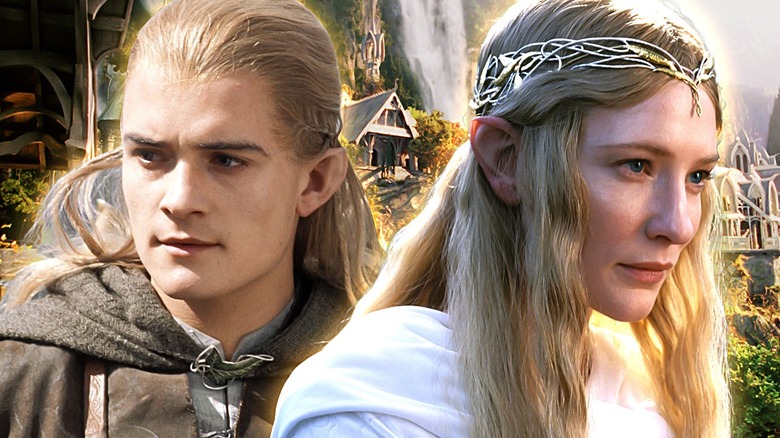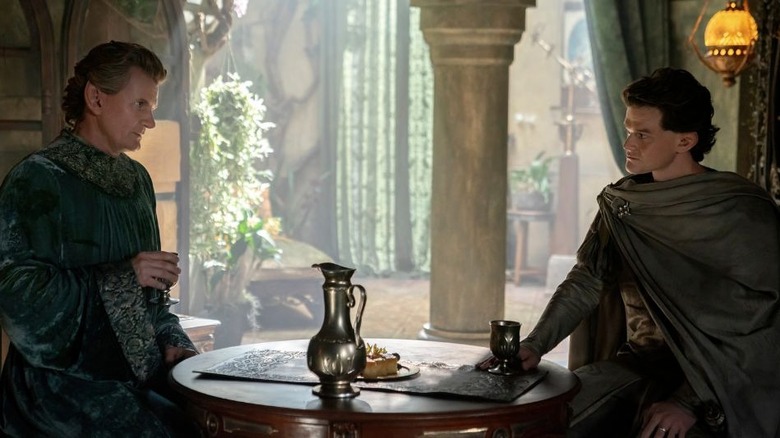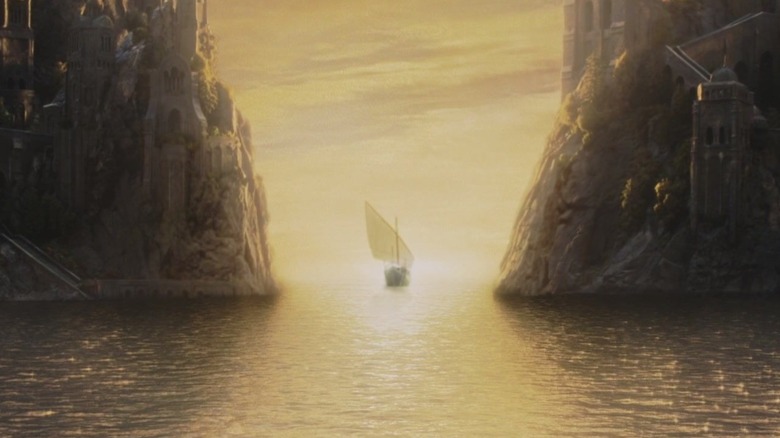The Lord Of The Rings: Why Are Elves Immortal?
One of the defining characteristics of J.R.R. Tolkien's Middle-earth is that Elves are immortal. Characters like Elrond and Galadriel live for thousands of years as generation after generation of mortal Dwarves and Men grow, live, and die around them. But why are Elves immortal? While the question is a complicated one, it's possible to cobble together an answer by looking at several of Tolkien's posthumously published books. The author explained in his writings that the Elves were the Firstborn, the first of two groups of "Children" made by the Creator, Ilúvatar. Men were the second of these groups, called the Secondborn or the Aftercomers.
Men are given the distinct gift of Death and are allowed to pass from the boundaries of the world when they lose their mortal bodies. In contrast, Elven bodies and spirits are bound to Arda, the created Earth. In "The Silmarillion," Tolkien explained, "Immortal were the Elves, and their wisdom waxed from age to age, and no sickness nor pestilence brought death to them."
Earlier in that book, the author added that the Elves love the Earth and have greater bliss in the world than Men, noting, "For the Elves die not till the world dies, unless they are slain or waste in grief ... neither does age subdue their strength, unless one grows weary of ten thousand centuries." So, while Men are gifted with Death, Elves are given the more poignant living experience as creatures bound, body and soul, to the Earth in perpetuity until the world itself ends.
Are Elves really immortal? Kind of.
The tricky thing with J.R.R. Tolkien is that the man was a philologist. He loved language, worked on dictionaries, and never used words without thinking about them thoroughly. When it comes to the term "immortality," even though he did use that term in relation to the Elves at times, Tolkien was careful to differentiate between true immortality, which takes place beyond the bounds of the world, and what he called in a letter in 1958 "limitless serial longevity." The former, he defined as freedom from Time, while the latter is clinging to Time. This reinforces the concept that Elves may appear immortal, but they are technically bound to the Earth and will continue as long as it does — which is not forever.
In addition, it's no secret that Elves can be killed. Their physical bodies can also waste away from grief or weariness. Even then, though, while the spirits of deceased Men may leave to an unknown fate outside of the Earth, for Elves, their fëa or spirits remain in Arda, bound to their fate both in life and death.
Since Elves are immortal in the sense that they never leave the world, it's tempting to think they don't have an afterlife, either. But that isn't quite true. After all, if their physical bodies can die, it implies that their spirits need to go somewhere, right?
Is there an Elvish afterlife?
When an Elf's physical body (called hröa as opposed to their spiritual "fëa") dies, their disembodied spirit is gathered in the Halls of Mandos, which is the Earthly equivalent to an afterlife. These halls are far in the west, overseas within an area called the Undying Lands. Once in the Halls of Mandos, they wait, either for the end of days or to be given a new body and reappear in the world. The latter notably happens to the Elf-lord Glorfindel, who honorably dies in battle with a balrog in the First Age and is sent back with a new body to fight against Sauron at a later date.
Even for Elves who don't lose their mortal bodies through some negative event like battle or disease, they don't merely continue in unblemished perpetuity. J.R.R. Tolkien said that, given enough time, their bodies slowly fade as their spirits, in essence, wear out their physical forms. This fading becomes more pronounced in later Middle-earth history as the Human race begins to displace Elves and take a larger role in the geopolitical limelight.
Whether it's through fading, physical death, or the end of the world, Elves don't possess a truly constant immortal existence. Instead, they are bound to the Earth, giving them the appearance of immortality as they cling to existence without the limited boundaries of time itself, waiting for the end of the World, when they will meet the unknown fate that their Creator has appointed for them.


